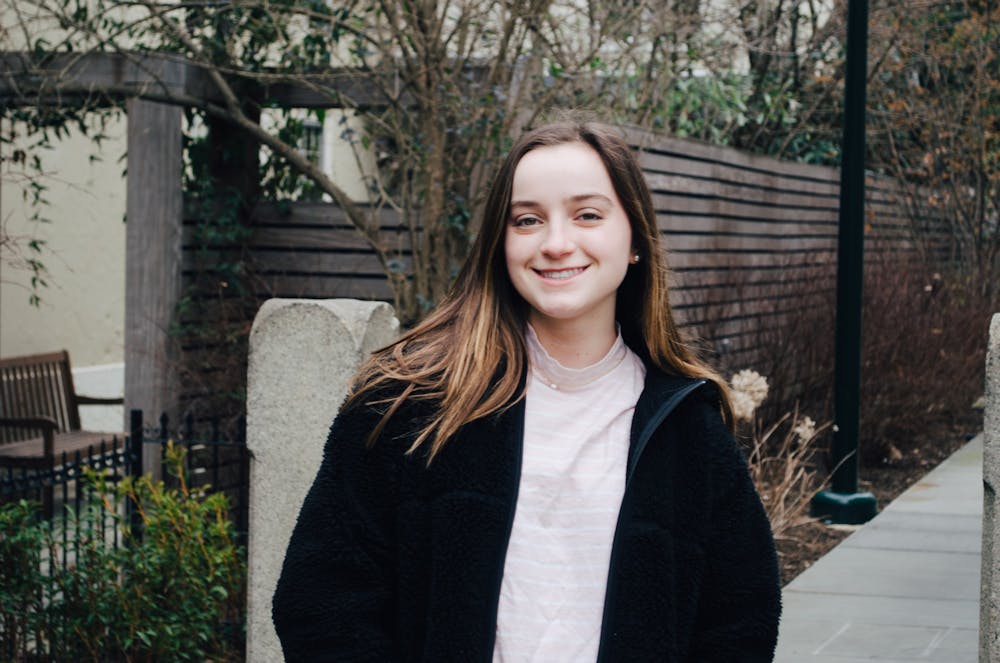Growing up extremely shy and quiet, Maura Fay (C ’20) decided that there was no better time than college to “step it up and actually get out there.” This was her thought process as she navigated her first semester and applied to TableTalk, a club with the motto: “Join the Conversation.” Now, as a second–semester senior, Maura serves as the club's co–president and has led the group through both challenging and rewarding stages.
Maura shares the history of TableTalk, a national organization with chapters at multiple universities.
“TableTalk first started at Emory and then a Penn student named Sophie Beren brought it to Penn in 2015 as the second chapter. Sophie was the founder and she was a senior when I was a freshman. It started growing from there, and I think Penn is now the biggest chapter.”
She offers, what she jokingly calls, her “elevator pitch” for TableTalk, saying “TableTalk is a group at Penn that tries to create new ways for students at Penn to meet other students they wouldn't normally meet under regular daily conditions,” and then continues with describing the three specific branches of TableTalk: TableTalks, CampusCouches, and TableTalk [X], all of which provide a unique approach to facilitating conversation.
The TableTalks branch, which hosts “sit–down, structured events organized around a certain topic” about five times a semester, takes a very different approach from the unstructured CampusCouches, which sets up inflatable couches on College Green “whenever the weather is outside is nice.” The “creative branch,” TableTalk [X], is the hub for new events and initiatives, one of the most recent being a weekly podcast featuring Penn students.
For Maura, the most important thing about TableTalk is that it’s open for everyone, no matter their “background, major, or social scene.” She wants people to feel like there’s a place where “people want to meet them and are interested in what they have to say.”
This philosophy of “openness” is the main reason why, as of spring 2020, TableTalks has dropped their application and interview process, opting instead for an open recruitment model where anyone who wants to join can.
“We actually just switched to an open recruitment model because we used to do applications and interviews, but started to feel like it wasn't really in line with the purpose of the club. We want it to be a very open club and we want people to feel welcome,” she explains.
Maura admits that they were a little nervous going into the new semester and didn’t quite know what to expect, but they have seen great results so far.
“We were kind of nervous about it. Like what if we get a hundred people? But, I think since it's the spring, it wasn't as much. And it has worked. We got ten new people who are really into it. And we got a lot of really awesome people last semester too. So it's been a really good year," Maura says. "We also do a lot of internal social things. So we have parties, we do social events just for members, we do coffee chats. We really try to foster a strong bond within our club as well, and that's been really good.”
When choosing the topics of discussion, Maura says they usually seek out potential clubs to collaborate with. One of the most popular TableTalks is an annual collaboration with the Student Committee on Undergraduate Education, where the two groups work together to facilitate a conversation about life at Penn and education policy.
Maura’s personal favorite is their collaboration with Penn Wellness and Penn Benjamins. She finds it inspiring how “people really do open up about mental health in ways that it usually isn’t talked about on campus.”
Another thing the committees look for is relevant topics that students would have strong opinions on. Therefore, many TableTalks have to do with current hot topics in politics, such as climate change, immigration, and gun control in an attempt to hear different sides of an issue.
Though Maura believes the best conversations happen “when there’s multiple opinions being contributed,” rather than when everyone shares one general consensus, it has proved tough to consistently draw in a diverse set of political opinions here at Penn.
“We usually get a lot of people with slightly different opinions on the same side of the issue, and although that is really valuable, I wish we attracted more of a diverse group to our events. It’s sometimes hard, especially at Penn, to get a lot of people with conservative opinions to come talk about a political topic. This is definitely something we want to work on going forward,” she says.
Being involved in TableTalk has influenced Maura’s Penn experience in almost every way. It has helped her develop her public speaking skills, but more importantly, being a part of so many meaningful conversations has taught her how important it is to see and understand multiple points of view, both in and out of the classroom.
“What makes me really happy is that TableTalk is exactly what I’ve imagined myself doing ever since I first came to Penn. The first year can be really hard and it’s easy to feel so alone even though there’s tons of people around you. TableTalk constantly reminded me that everything’s going to be okay because there are people around me who care about me and what I have to say.”







